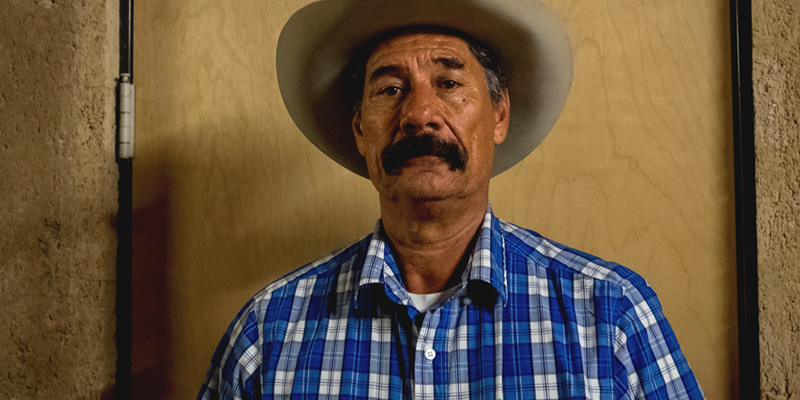
On election night in Napa Valley, Enrique Ayón was glued to the TV. Ayón, a Mexican citizen who’s worked in the wine industry for 20 years, was sure Clinton would win — she had experience, and he couldn’t imagine voters would support Trump after the way he had insulted Mexicans and women, among others. Ayón hoped a Clinton presidency would bring more stability and legal rights to vineyard and winery workers. But as the electoral map started filling in with red, the mood in the common room turned to disbelief, and then sadness. Days later, Ayón was still upset.
“I don’t understand why so many people supported Trump and thought what he said was okay,” he said in Spanish. “How can life be so difficult and so unfair?”
Ayón had watched the election at a farmworkers housing center in St. Helena called the River Ranch Farmworker Housing Center. It’s one of three centers providing affordable dormitory-style housing to male farmworkers in Napa Valley.
As the shock subsides, Ayón and other workers at the River Ranch housing center voiced worry about their futures and even their safety. Some said they are trying not to panic about a Trump presidency, but they’re also making contingency plans. And many are hoping the wine industry won’t turn its back on the workers who have helped build it.
Ignacio Trujillo Lopez, a tall man with five children and eight grandchildren, has been trying to calm the younger workers’ nerves. Trujillo first came to the U.S. from Michoacán to pick fruit when he was 14. He has worked in Napa Valley since the 1970s. To quell the fear, Trujillo points out that there’s a huge difference between what politicians say and what they actually do — even when what they’re promising might help migrant workers. “Let’s talk about Obama,” Trujillo said. “He said he wanted to help Mexicans get legal status. Instead he’s been one of the presidents who’s kicked out more Mexicans than any other — millions of people.”
Not all of Napa’s farmworkers are undocumented. Trujillo, for example, is a naturalized U.S. citizen and others have temporary work visas. Still, Trujillo is skeptical that Trump could really deport the millions of undocumented immigrants who work in the country’s vineyards and farm fields. Doing so would destroy the rural economy, he said, because Mexicans do the hard work that Americans don’t want to. “Where are the Americans that are going to come out and pick grapes all night? There aren’t any,” he said. “We are the ones who at 10 p.m. will be putting on our head lamp to go spend the whole night picking fruit.”
Others agree with him, if tentatively. Sitting at a long table in River Ranch’s dining room, Jesus Tena said he was still shocked that “the Señora” hadn’t won the election. Tena hopes that the U.S.’s system of checks and balances will help keep Trump from fulfilling his campaign promises. Otherwise, he predicts disaster. “If Trump was allowed to do everything he wants to do, he’d destroy the entire country in a single year!” he said with a laugh.
Tena’s biggest worry is that Trump has emboldened racists. “Now we feel totally unprotected wherever we go,” he said. “We could just be walking down the street and if someone sees that we have Latino skin, they might start beating us up or run us over with their car.” Even though Trump has disavowed some of his more blatantly racist supporters in recent days, Tena said it’s too little too late.
“He is like a father who gives his son a pair of wings and then gets mad when he sees he can’t keep him on the ground,” he said.
Asked about Trump’s pledge to build a wall and get Mexico to pay for it, Tena could only scoff. “Mexico cannot pay for the things its neighbor wants,” he said. “If you’re building your house, you’re going to build it as best you can. You are not going to ask your neighbor to chip in to build your house, are you?”
But others feel too worried to scoff, like Gregorio, a young man who asked that his last name not be published because he is undocumented.
Gregorio didn’t leave Mexico because he wanted to, but because there was no other way to support his family. Gregorio left home at age 16. He crossed the desert on foot over four nights, then spent five years working in a chicken processing plant in Oklahoma. After that, he went home for a year, but economic need sent him over the border again, this time to California. Gregorio says Napa Valley has been good to him. The pay and conditions are better than in Paso Robles and Salinas where he has also worked. He’s been able to send home enough money to support his parents and even build himself a house.
Gregorio is most worried for the families that will be separated if Trump starts deporting undocumented people. But he says it won’t be a disaster if he himself is kicked out. Part of him would like to return to Mexico and start a family, though he doesn’t know how he would make a living. “I really don’t know what is going to happen,” he said. “The truth is that it is us, the ones without documents, who are going to lose the most. We are simply going to have start all over again in Mexico or El Salvador or wherever we came from.”
But as Ayón points out, mass deportations could make life in places like Mexico even more difficult than it already is. “There will be more people and fewer services,” he said. “The government can’t even take care of the people there now, much less if there are more people.”
Then there’s the question of who will pick the grapes for Napa Valley wines if Trump starts deporting immigrants.
Faced with the prospect of life under President Trump, Ayón says he feels afraid and powerless. But many in Napa Valley have a great deal of influence, and Ayón says now is the time for them to use it to defend their workers. “Those that do have power should use it to demand a bit more fairness for us,” he said. “Behind all of these wealthy people, behind all of these wineries, are the hands of many immigrants.”


